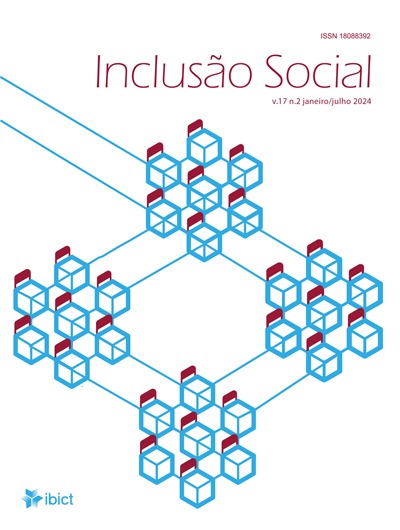GRIS Articulator: A Social Business Archetype for Management in Responsibility and Social Intelligence from the Perspective of Social, Environmental, and Corporate Governance
DOI:
https://doi.org/10.18225/inc.soc.v17i2.6995Keywords:
ESG, GRIS framework, social responsibility, social intelligence, private social investment, articulator, servitizationAbstract
This paper is the culmination of research undertaken during my postdoctoral research, aimed at fostering a deeper understanding of pragmatism and the common good, particularly in the context of Environmental, Social, and Governance (ESG) criteria within businesses, governmental bodies, and territories. The paper introduces the foundational principles of this study, along with a detailed examination of the GRIS framework. This framework, rooted in ESG principles, hinges on the dual concepts of responsibility and social intelligence, providing a platform for the collaborative development of strategies to address pressing and evolving challenges in climate, environment, and social sectors through private social investments. The paper delves into various archetypes of articulators, with a special focus on the GRIS Articulator and its unique servitization model. The research concludes with key observations and analyses drawn from extensive engagement in the ESG sector.
References
BURNET, John. A aurora da fi losofi a grega. Tradução: Vera Ribeiro. Rio de Janeiro: PUC Rio, 2007. p. 151-159.
THE WORLD BANK. Corporate governance. World bank group, [s. l.], fev. 2016. Disponível em: https://www. worldbank.org/en/topic/fi nancialsector/brief/corporate-governance. Acesso em: dez. 2022.
CARVALHO, Fábio. Gestão do conhecimento. São Paulo: Editora Pearson, 2012.
CONSELHO Empreserial Brasileiro para o Desenvolvimento Sustentável. CEBDS, [s. l.], c2023. Disponível em: https://cebds.org/. Acesso em: dez. 2022.
ESG: o que é, como funciona, vantagens e características. TOTVS, [s. l.], out. 2022. Disponível em: https://www. totvs.com/blog/business-perfomance/esg/. Acesso em: 17 jan. 2023.
ESTEVES, Regina. Governança ambiental, social e corporativa: por que precisamos falar de ESG? Exame, [s. l.], fev. 2021. Disponível em: https://exame.com/colunistas/regina-esteves/governanca-ambiental-social-e-corporativa por-que-precisamos-falar-de-esg/. Acesso em: 17 jan. 2023.
GIFE. Os diálogos e as possibilidades entre o investimento social e a agenda ESG. Rede GIFE, São Paulo, 2021. Disponível em: https://gife.org.br/os-dialogos-e-as-possibilidades-entre-o-investimento-social-e-a-agenda-esg/. Acesso em: 17 jan. 2022.
GIRALDI, Janaina. Tipos de organizações. Faculdade de Economia, Administração e Contabilidade de Ribeirão Preto da Universidade de São Paulo. Ribeirão Preto: 2020. Disponível em: https://edisciplinas.usp.br/pluginfi le. php/5517372/mod_resource/content/1/TO%20Introd%20Aula%202.pdf. Acesso em: 17 jan. 2022.
GOLEMAN, Daniel. Social intelligence: the new science of human relationships. New York: Bantam Books, 2006. 405 p.
GONÇALVES, Raulino Pedro. O empreendedorismo social: em qual setor você se encaixa? In: NEVES, Francine Simas; BEHLING, Gustavo (org.). Central de empreendedorismo empreenduca. 1. ed. Itajaí: Univali Editora, p. 55-78, 2021. Disponível em: https://univali.br/vida-no-campus/editora-univali/e-books/Documents/en/E-book%20 Empreenduca.pdf. Acesso em: dez. 2022.
HOLLENDER, Jeff rey; BREEN, Bill. The responsibility revolution: how the next generation of business will win. [S. l.]: Jossey-Bass, 2010. 240 p. ISBN 9780470558423.
JUNG, Carl Gustav. Os arquétipos e o inconsciente coletivo. 2. ed. Tradução: Maria Luíza Appy, Dora Mariana R. Ferreira da Silva. Petrópolis: Vozes, 2002. Título original: Die Archetypen und das kollektive Unbewusste. ISBN 85.326.2354-9 (Brochura).
MANDELBROT, Benoit B. The fractal geometry of nature. New York: W. H. Freeman and Company, 1975.
OLIVEIRA, Gustavo J. Ponto n. 4: Natureza jurídica das entidades do terceiro setor. São Paulo: Faculdade de Direito da Universidade de São Paulo, set. 2016. Disponível em: https://edisciplinas.usp.br/pluginfi le.php/1985367/ mod_resource/content/1/Ponto%204%20-%20Natureza%20jur%C3%ADdica%20das%20entidades%20do%20 terceiro%20setor.pdf. Acesso em: dez. 2022.
POLMAN, Paul; WINSTON, Andrew. Net positive: how courageous companies thrive by giving more than they take. Brighton: Harvard Business Review Press, 2021. 352 p.
PORTER, Michael E.; KRAMER, Mark R. Creating shared value: how to reinvent capitalism: and unleash a wave of innovation and growth. Brighton: Harvard Business Review, Jan./Feb. 2011.
SALVADORI, Mateus. Heráclito e o mundo como um eterno devir. Youtube, 30 de julho de 2019. Disponível em: https://www.youtube.com/watch?v=Xe4FHMAehHg. Acesso em: 17 jan. 2022.
SANTANA, Ana Lúcia J. M.; SOUZA, Leandro M. (org.). Empreendedorismo com foco em negócios sociais. Curitiba: NITS-UFPR, 2015. 172 p. Disponível em: http://ice.org.br/blog/wp-content/uploads/2017/09/A.-Lucia Jansen-EMPREENDEDORISMO_NEGOCIOS-SOCIAIS.pdf. Acesso em: 17 jan. 2022.
SENGE, Peter M. The fi fth discipline: the art and practice of the learning organization. New York; London; Toronto; Sydney; Auckland: Doubleday/Currency, 1990.
Downloads
Published
Issue
Section
License
Copyright (c) 2024 Alexandra Augusta Pereira Klen

This work is licensed under a Creative Commons Attribution-NonCommercial-ShareAlike 4.0 International License.
- A publicação se reserva o direito de efetuar, nos originais, alterações de ordem normativa, ortográfica e gramatical, com vistas a manter o padrão culto da língua, respeitando, porém, o estilo dos autores;
- As provas finais não serão enviadas aos autores;
- Os trabalhos publicados passam a ser propriedade da revista Inclusão Social, ficando sua reimpressão total ou parcial, sujeita à autorização expressa da direção do Ibict;
- Deve ser consignada a fonte de publicação original;
- As opiniões emitidas pelos autores dos artigos são de sua exclusiva responsabilidade;
- Cada autor receberá dois exemplares da revista, caso esteja disponível no formato impresso.





